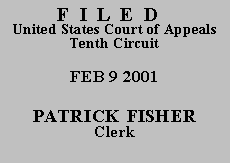

| ARCHIE WATKINS, JR.,
Petitioner-Appellant,
v.
MICHAEL A. NELSON; ATTORNEY
GENERAL OF THE STATE OF
KANSAS Respondents-Appellees. |
No. 00-3233
(D.C. No. 98-CV-3362-DES) (Kansas) |
Mr. Watkins was convicted in 1987 in state court of aggravated burglary and aggravated robbery, and sentenced under the habitual offender statute then in effect to terms of fifteen years to sixty years and forty-five years to life. Although the KSGA applies to crimes committed on or after July 1, 1993, see Kan. Stat. Ann. §§21-4704, 21-4705, it contains a limited retroactivity provision applicable to certain offenders sentenced under the prior sentencing scheme whose crimes and criminal history would have resulted in lower sentences under the KSGA. See id. § 21-4724(b). Mr. Watkins is not eligible for treatment under the retroactivity provision. He contends that, because those offenders not eligible for retroactive consideration are treated differently merely on the basis of the date on which they committed their crimes, the Act results in an unconstitutional denial of equal protection. He also contends that because he is disadvantaged by his exclusion from the benefit of the limited retroactivity provision, the Act is impermissibly retroactive.
Upon careful review of Mr. Watkins' equal protection argument in light of the applicable case law, we conclude that his position is without merit. Both the Kansas courts and the district court have addressed this argument and rejected it. See Chiles v. State, 869 P.2d 707 (Kan.), cert. denied, 513 U.S. 850 (1994); Jones v. Bruce, 921 F. Supp. 708 (D. Kan. 1996). For the reasons set out in those opinions, we hold that Mr. Watkins' ineligibility for the limited retroactivity provided by the KSGA does not deny him equal protection.
We are also unpersuaded that the KSGA is impermissibly retroactive. While that Act may treat more favorably defendants sentenced under its provisions and those who come under its limited retroactive provision, it does not for that reason increase the punishment for those sentenced before it came into effect.
Accordingly, we conclude that Mr. Watkins has failed to make a "substantial showing of the denial of a constitutional right." 28 U.S.C. § 2253(c)(2). We therefore DENY his application for a certificate of appealability and DISMISS his appeal.
ENTERED FOR THE COURT
Stephanie K. Seymour
Chief Judge
*.After examining appellant's brief and the appellate record, this panel has determined unanimously that oral argument would not materially assist the determination of this appeal. See Fed. R. App. P. 34(a)(2) and 10th Cir. R. 34.1(G). The case is therefore submitted without oral argument. This order and judgment is not binding precedent, except under the doctrines of law of the case, res judicata, or collateral estoppel. The court generally disfavors the citation of orders and judgments; nevertheless, an order and judgment may be cited under the terms and conditions of 10th Cir. R. 36.3.
1. Mr. Watkins also lost in the district court on his claim that he was denied his constitutional right of access to the courts. He does not appeal on this issue.